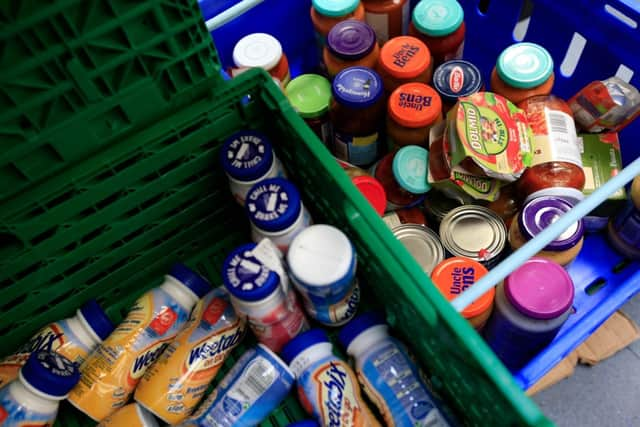Use of Wakefield foodbanks falls below pre-pandemic levels
and live on Freeview channel 276
The Trussell Trust, a charity tackling poverty in the UK, supports the country’s largest network of food banks.
Over the course of the coronavirus pandemic, they have seen a dramatic increase in the number of emergency food parcels handed out to those in need nationally.
Advertisement
Hide AdAdvertisement
Hide AdBut figures from the charity suggest food bank use fell below pre-pandemic levels in Wakefield last year.


The Trussell Trust’s distribution centres handed out 4,741 emergency food parcels to people in Wakefield in the year to March – up from 3,951 the year before, but a decrease of 16% on the 5,624 provided in the year to March 2020, before the onset of the Covid-19 pandemic.
However, due to a growing number of independent food banks and the existing work of other organisations and charities, the Trussell Trust warns that its figures do not show the full extent of food poverty in the UK.
The charity typically hands out emergency packages containing three days’ worth of food. Since the start of the pandemic, it has also started providing supplies in seven-day packages, in response to growing need and to limit the number of deliveries.
Advertisement
Hide AdAdvertisement
Hide AdAcross Yorkshire and The Humber, 156,120 parcels were handed out by the region’s 102 distribution centres in the year to March.
The Trussell Trust warned that food bank use has accelerated in the past six months, as the rising cost of basic amenities has hit people’s pockets.
Emma Revie, chief executive of the charity, said: “People are telling us they’re skipping meals so they can feed their children. That they are turning off essential appliances so they can afford internet access for their kids to do their homework.
“How can this be right in a society like ours? And yet food banks in our network tell us this is only set to get worse as their communities are pushed deeper into financial hardship.
Advertisement
Hide AdAdvertisement
Hide Ad“No one’s income should fall so dangerously low that they cannot afford to stay fed, warm and dry.”
In year to March, 36% – or 1,709 – of the parcels handed out in Wakefield were given to children, down from 1,995 in the year before the pandemic.
And across the UK at large, nearly 2.2 million parcels were distributed in the year to March 2022 – fewer than the 2.6 million the year before, but a significant increase on the 1.2 million provided five years ago in the year to March 2017.
The Department for Work and Pensions said that it recognises the pressures on the cost of living and is "doing what it can" to help, such as spending £22 billion across the next financial year to support people with energy bills and fuel duty.